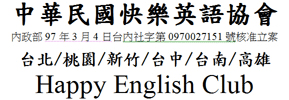網站 http://www.happyforum.org/ 歡迎超連結並轉寄網址
論壇 http://www.happyforum.org/happy/ 歡迎至論壇討論
Time:第 182次例會,2008年11月15日(週六)下午2:30 ~5:30
Place:
viewtopic.php?t=15
14:30~15:30 Free Talk
15:30~16:00 Speaker Session
16:00~17:15 Topic Discussion
17:15~17:30 Happy Time
Host: Carmen Tao(Taipei)
Assistant Host:
Topic:An excerpt of 「Sound Review」
Source: Journal of American Folklore 121 (480); P222-223
For many, the Taiwan aboriginal music world begins and ends with pop group Enigma's (某德國樂團) controversial single, 「Return to Innocence」(反璞歸真). Interweaving the voice of Amis(阿美族) singer Difang(郭英男』s aboriginal name) with layers of electronic sounds, 「Innocence」 was exotic an ambient, and it also proved catchy enough to serve as an advertisement theme song for the 1996 Atlanta Olympics. Through this song, much of the world came to hear Taiwan aboriginal music for the first time, without realizing what they were hearing. Difang (1922-2002) discovered his stardom through a friend who had caught the song on radio, and he asked EMI to be credited on the album. When his request was turned down, he filed a lawsuit against Enigma in 1997. The parties reached an out-of-court settlement in 1999.
Various reports on the case provide views on the role of ethics in negotiating social justice and copyright law. Enigma sampled Difang's voice without authorization from him; the group drew its sample from a 1978 recording of a weeding song collected by Taiwanese ethnomusicologist Hsu Tsang-houei.(民俗音樂學家 許常惠教授) Hsu deposited this and other Taiwan aboriginal recordings in Paris's 「Maison des Cultures du Monde」(法國巴黎世界文化館) in 1988. Some of the 1978 recordings were in turn issued, together with new material, on the Inedit album, 「Polyphonies vocals des aborigenes de Taiwan.」 After hearing this album, Enigma sought and obtained permission from 「Maison」 to use a sample and paid a transference fee. No one, however, bothered to determine the identity of the original singer or consider his intellectual property rights until Difang made the claim himself.
The politics of assigning blame and claiming compensation was tricky. Was Difang's name acknowledged on the Inedit release or even on Hsu's original field recordings, some of which featured ensembles with variable soloists? The answer to the former was 「no.」 Reports varied as to whether royalties paid by Enigma were eventually channeled to the original singer. Some researchers also point to Difang's fame, gained after his Olympic exposure. The Amis farmer was soon signed by the Taiwanese label 「Magic Stone Music」(魔巖唱片) to release two albums, 「Circle of Life」 and 「Across the Yellow Earth.「 These albums, put together by Deep Forest producer Dan Lacksmann, featured electronic remixes reminiscent of the problematic 「Innocence.」
This story is relatively well known, though most versions depict Enigma and EMI as using strong-arm tactics. That 「Innocence」 was a turning point in the Taiwan aboriginal record industry is without doubt. Difang's subsequent albums won accolades at Taiwan's equivalent of the Grammy Awards, the annual Golden Melody Awards. His success inspired a revival that saw aboriginal singers release their own albums. At the same time, it sparked debates about cultural ownership: some aborigines wondered whether the court settlement should have been made not to an individual but to the Amis people. The case also generated heightened awareness of copyright protection among village singers, now wary of singing to researchers and eager to claim authorship of aboriginal songs previously released on old vinyl records. Indeed, a thriving Taiwan aboriginal record industry had existed from the 1960s. Prior to 「Innocence,」 the aboriginal music scene boasted a cassette dynasty, whose largely aboriginal clientele spanned southern and eastern rural Taiwan
Aboriginal listeners are not the only audiences of aboriginal recordings today. Chang Hui-mei(張惠妹), a superstar in the Mando-pop(國語流行歌) world whose fan base extends beyond Taiwan, is of aboriginal Puyuma(卑南族) descent. Beyond Difang's 「Weeding Song,」 pieces from other aboriginal genres have also been making their way onto tape and CD. Some of these-evangelical hymns converted from aboriginal tunes-are products of church choirs, and other cater to urban audiences and the world music market.
Questions:
1. Who is your favorite singer?
2. What's your favorite song?
3. What genres of music do you like the most and the least? Jazz, Hip Hop, New Age, Classical, etc.
4. Do you still buy CDs nowadays? If so, please tell us why.
5. How would you feel if your works are pirated? Do you have any examples?
6. Have you ever been to any aboriginal tribes in Taiwan? For what? Please share your experience with us.
參與例會,請自行列印當週的討論文章並帶至現場,圖示如下:

http://www.happyforum.org/
新竹,每週六 (2008年8月起)
Hsinchu, Every Saturday
from Aug, 2008
Place:
viewtopic.php?t=15

台中,每週六 (2008年7月起)
Taichung, every Saturday
from July, 2008
Place:
viewtopic.php?t=15

高雄,每週六 (2007年4月起)
Kaohsiung, every Sunday
from April, 2007
Place:
viewtopic.php?t=15

台北,每週六 (2005年6月起)
Taipei, every Saturday
from June, 2005
Place:
viewtopic.php?t=15











